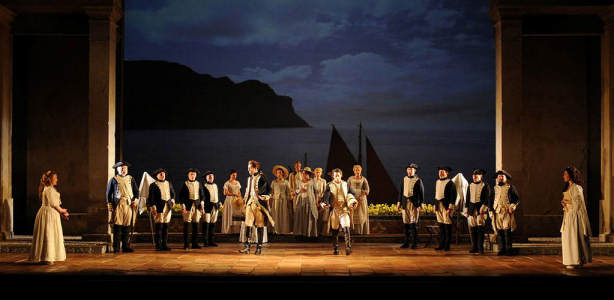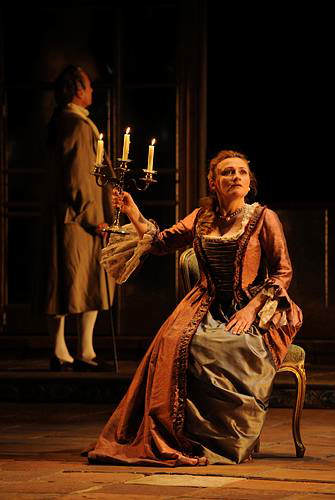Other Links
Editorial Board
-
Editor - Bill Kenny
-
Deputy Editor - Bob Briggs
Founder - Len Mullenger
Google Site Search
SEEN AND HEARD
UK OPERA REVIEW
Mozart, Così fan tutte: Soloists, Orchestra and Chorus of the English National Opera, Stefan Klingele (conductor). The Coliseum, London, 29.5.2009 (MB)
Fiordiligi – Susan Gritton
Dorabella – Fiona Murphy
Ferrando – Thomas Glenn
Guglielmo – Liam Bonner
Don Alfonso – Steven Page
Despina – Sophie Bevan
Abbas Kiarostami (director)
Elaine Tyler-Hall (associate director)
Malika Chauveau (designs)
Jean Kalman (lighting)
Chorus Master: Martin Merry)
Stefan Klingele (conductor)

ENO’s new Così fan tutte hit the headlines – or at least the arts headlines – some time before it opened, owing to our Teheran Embassy’s inability to provide director Abbas Kiarostami with a visa. After interminable wrangling, an exasperated Kiarostami, eventually pulled out; he entrusted work in London, the production having been premiered last year at the Festival d’Aix en Provence, to his deputy, Elaine Tyler-Hall. Even in the dying days of New Labour, British foreign policy remains on every level a disgrace. Still, our American friends will doubtless be relieved to hear that they are not alone in erecting such barriers to artistic cooperation. Some allowances might therefore be in order.
Kiarostami, it seems, did not even know the opera before it was suggested he direct it. There is indeed a sense of first acquaintance, for, unlike so many directors, this one appears to take the action at face value. Kiarostami’s Così is set where the libretto says it should be: the Bay of Naples, in period too. I have no problem with that; with the exception of Vesuvius, surely a gift for a director, although I have never seen it acted upon, the setting in itself seems largely immaterial to me. There are a couple of hints that we today are observing and engaged with something then: the filmed backdrop of a Neapolitan caffé during the first scene, and the unfortunate filmed backdrop of the orchestra during the final scene. I say unfortunate, since it is extremely – and unproductively – distracting to endure the discrepancies between a filmed account and what one is hearing from the pit. But nothing more is made of these then-and-now suggestions.
I suppose, to quote Geoff Andrew’s programme note on the director, that we are intended, as with Kiarostami’s films, ‘to engage ... actively rather than passively ... to exercise out imaginations rather than submit to the film-maker’s will’. Again, I have no problem with that, up to a point, but my imagination struggled with what seemed a traditional-by-default staging, almost a throwback – though I am not at all sure this was intended – to Michael Hampe’s 1983 Salzburg production (available on DVD, under Riccardo Muti’s baton), with the caveat that one would have seen such a production quite differently a quarter of a century ago. A concert performance or a recording might have done a better job in terms of firing the imagination. There was nothing perverse about this Così: a relief one should not underestimate, especially in the wake of Jonathan Miller’s Covent Garden production, a travesty, inexplicably lauded, which transforms this darkest, most sophisticated of comedies into a vulgar farce. Yet productions as different as the two most recent Salzburg versions, the first from Hans Neuenfels, and subsequently from Karl-Ernst and Ursula Herrmann, have enlightened and provoked, without being inappropriate. (I await impatiently the latest offering, this summer, from Claus Guth, whose Figaro impressed me so much in 2007.) Here, everything that makes Così so unbearably painful appears not so much to be disregarded as unappreciated, a failing which, understandably, given the parameters set, carried through into much of what we heard too. If you like Jane Austen, especially in television adaptation, this might entertain you. Martin Fitzpatrick’s English translation did not help: if Così must be translated, and I fail to see what is gained, then sophistication, not cheap laughs, should be the order of the day in conveying Lorenzo da Ponte’s fine text.

Susan Gritton as Fiordiligi
The cast was a likeable bunch; if there was little in the way of dramatic penetration, this must in part be ascribed to the production. At her best, Susan Gritton impressed as Fiordiligi. She has a strong but not overwhelming stage presence and is a thoughtful musician. Yet her tuning was not always impeccable, a drawback which was sometimes difficult to ignore. Fiona Murphy was a spirited Dorabella, well differentiated from her more thoughtful sister. Liam Bonner’s Guglielmo had the occasional rough edge but for the most part this was a winning portrayal. Although Thomas Glenn’s voice is not unattractive, it was often over-parted as Ferrando. Stevan Page’s Don Alfonso was more character than vocal triumph, but so too, it seems, was the creator of the role, as is reflected in Mozart’s writing. Sophie Bevan was a characterful, unusually youthful Despina, without the irritating traits of so many of her predecessors, but also unfortunately prone to a few intonational difficulties.
Conductor Stefan Klingele has been touted in ENO’s publicity as a ‘Mozart specialist’. Poor man! I have no idea what a ‘Mozart specialist’ would or could be expected to do; the idea certainly in no way approaches what might best suit Mozart. Is Sir Colin Davis a ‘Mozart specialist’? Is Daniel Barenboim? Were Karl Böhm and Otto Klemperer? Of course not. They are or were great musicians with a particular but far from exclusive feeling for and understanding of Mozart’s music, such feeling and understanding enriched by the host of other music, art, and ideas informing their experiences. I tend to agree with Boulez who has described specialists, in particular those of the ‘authenticke’ brigade, as ‘specialists in nullity’. This is why he always insisted that those auditioning for the Ensemble Intercontemporain should play a classical piece as well as a modern work. One wants – or at least I do – to hear the Berg in Mozart and the Mozart in Berg. (To do just this, listen to Boulez’s recent Decca CD of Mozart’s Gran Partita and Berg’s Chamber Concerto – with the Ensemble Intercontemporain.)
What then, did this publicity tell us about Klingele? Nothing: he has conducted quite a bit of Mozart, but also much else; indeed, his website opens to the strains of Salome. Most importantly, he did a good job in an extremely difficult assignment. I had a few cavils: there was an unfortunate tempo change, repeated and therefore not a slip, in the overture, and there were passages, for instance in ‘Alla bella Despinetta’ and the end of the first act finale, in which the conducting became noticeably foursquare. Yet, for the most part, he conducted fluently and with an evident love for the score. There were no authenticke mannerisms to endure and he generally brought the best out of the ENO orchestra. A sour oboe aside, the woodwind often sounded magical, as did, bar one unfortunately exposed slip, those horns of incipient cuckoldry in ‘Per pieta, ben mio’. I felt little of the extreme pain with which Mozart’s most ravishing score should instruct us, but the production provides some explanation for this. Moreover, given the horrors unleashed by so many contemporary Mozart performances, one could certainly be grateful for what one heard.
I am sure that most people attending will have had a relatively enjoyable evening; in many respects, I did. Yet, when one reflects, as surely one ought to after a performance of Così, not to have been disturbed by this most truly shocking of works, this most unsparing revelation and indictment of romantic love, is disturbing in the wrong way.
Mark Berry
Pictures © Stephen Cummiskey
Back to Top
Cumulative Index Page
